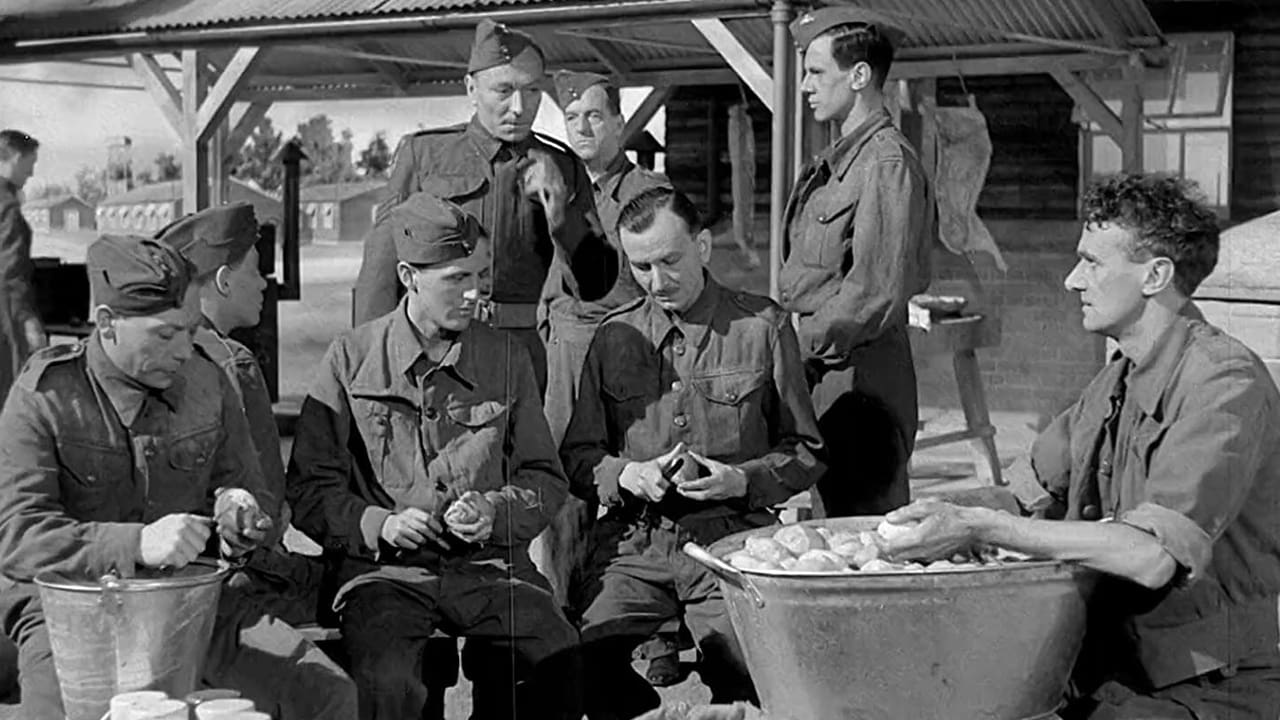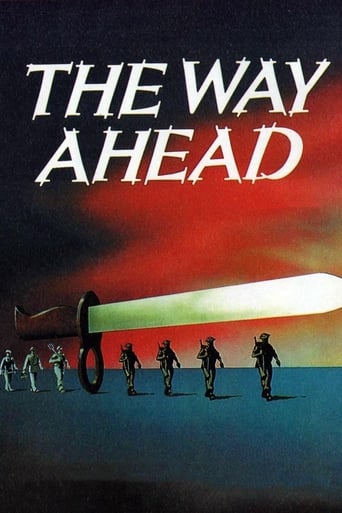Dorathen
Better Late Then Never
CookieInvent
There's a good chance the film will make you laugh out loud, but if it doesn't, there's an even better chance it will make you openly sob.
Juana
what a terribly boring film. I'm sorry but this is absolutely not deserving of best picture and will be forgotten quickly. Entertaining and engaging cinema? No. Nothing performances with flat faces and mistaking silence for subtlety.
Phillipa
Strong acting helps the film overcome an uncertain premise and create characters that hold our attention absolutely.
robertguttman
"The Way Ahead" is an interesting film produced in Britain during World War II to support the war effort by drawing on the talents of an outstanding group of noted British personalities, including Erik Ambler, Carol Reed, Peter Ustinov. The actors comprise and ensemble of some of the most recognizable British character actors of the 1940s and 1950s, not least among whom are David Niven and Peter Ustinov, who actually were serving in the British Army at the time. The plot follows a polyglot assortment of civilians who are drafted into the British Army at the Beginning of World War II, undergo basic training and eventually emerge as an efficient fighting unit. It is not a new story but it is done very well in this case, thanks to excellent writing and direction, and the equally expert ensemble cast.However, I must admit that I have only seen this film in the United States under it's alternative title, "the Immortal Battalion". I could not help coming away with the suspicion that the original film must have been somewhat cut and reedited before release in the U.S. I don't know for a fact if that was the case, but certain hints here and there in the story line, as well as certain odd gaps in continuity, suggest that may have been the case. I find it difficult to believe that Erik Amber, Peter Ustinov and Carol Reed would have been satisfied with such clumsiness of production, so I can only assume that the film must have been clumsily reedited later by somebody else. For that reason, I find it difficult to judge this film fairly without comparing it with the original UK version, which I strongly suspect differs somewhat from the version shown in the U.S. Nevertheless, I still recommended it highly.
ackstasis
War films produced during WWII are very different to those released in the decades afterwards. Back then, it was an honour and a privilege to fight for one's country, and dying was often an essential part of a soldier's service. This idealistic cinematic patriotism apparently emerged in the late-1930s in response to the rise of Nazism, with Hollywood filmmakers swiftly abandoning the tragic, sobering view of war explored in earlier films such as Milestone's 'All Quiet on the Western Front (1930).' The primary motives of WWII war films can usually be whittled down to three simple phrases: we're good; they're evil; we're going to win. These works of propaganda have obviously long since lost their topicality, and most cease to be anything but historical curios. 'The Way Ahead (1944)' does nothing of the sort. Having started its life as an army education short called 'The New Lot (1943),' this film had every opportunity to wind up as nothing more than a propaganda piece, but director Carol Reed knew what he was doing. For fans of British cinema, this is an unexpected treat.Unlike most war films of the era, 'The Way Ahead' contains hardly an ounce of propaganda. With the exception of one very brief scene (in which a soldier verbosely extols the virtues and importance of the armed infantry), the film never speaks down to its audience, and rarely feels as though it is trying to communicate an underlying agenda. Above all else, Reed's film is about human relationships, and how a ramshackle selection of mismatched recruits can evolve into a close-knit squad of soldiers who respect each other and can work together towards a common goal. That this common goal is ultimately the eradication of the Nazis is addressed only indirectly, and, fortunately, we're spared a bravura closing monologue about an impending Allied victory. The film instead closes with its British heroes marching purposefully through the fog, facing the unknown but full of courage and hope (reminiscent of 'Casablanca (1942)' two years earlier). Reed emphatically replaces the customary "The End" with "The Beginning," signalling hope for the future without ramming optimism down our throats.'The Way Ahead' succeeds as superior war drama because its characters are real people, and not merely symbols who represent an ideal. David Niven's character, Lieutenant Jim Perry, is a kind and understanding leader, perhaps the sort of man whose authority one could flout without fear of reprimand. Rather than exploiting his higher rank, Perry instead appeals to his recruits' sense of pride and camaraderie, eventually winning their obedience, not through power, but through loyalty. His soldiers, each man an interesting and individual character, are played by James Donald, John Laurie, Leslie Dwyer, William Hartnell and man-about-British-cinema Stanley Holloway, among others. Eric Ambler and Peter Ustinov's screenplay covers a lot of territory. Without ever feeling rushed, the film covers the pre-military lives of the soldiers, the patchy first weeks of training, their development into a cohesive group, their disastrous first attempt at entering the war, and their final heroic efforts in fighting the Germans – including an earth-shattering battle sequence that sees entire buildings crumbling to the ground.
Spikeopath
The threat of World War II hangs heavy and British civilians are called to basic military training in preparation for combat. Here we follow a very mixed bunch of men indeed, coming from all walks of life and divided by the class system, these men refuse to embrace the army way of life. As the training moves on and the men start to learn their craft, it becomes apparent that they are soon to see action, and sure enough these odd assortment of soldiers are called to finally prove their worth, not only as soldiers, but also as men of equal stature.Essentially a story of how war doesn't discriminate against the classes, Carol Reed's The Way Ahead boasts a fine cast on form and a script of character driven intelligence. Acting as a sort of call to arms to a country under pressure, the picture however now looks incredibly dated unless one can comprehend the time frame the picture deals with. It's well crafted {to be expected with Carol Reed in the directors chair}, and the last quarter, where the walls literally do come tumbling down, is octane effective and closes the film with triumphant might.Enjoyable picture for sure, but really not one to seek out at regular intervals. 6.5/10
ubercommando
I really can't understand some of the more negative comments from some reviewers from the USA about this movie. For me, it is far superior to equivalent American wartime propaganda movies (including enjoyable but hardly realistic efforts such as 7 Graves To Cairo and Sahara), and made and acted by a British cast who were serving servicemen as well (unlike a certain J. Wayne or H. Bogart). Carol Reed gives us on the surface a cliche ridden movie but his gritty visual style which would become his trademark plus a script that still gives depth to a by now familiar concept lift this way above other movies made at the time.The soldiers don't look pristine and for most of the time, don't act heroically until the last 5 minutes. They're not an elite unit (as in Sands of Iwo Jima), they grumble, complain and stagger their way to the front lines but nor are they goofballs, pranksters or loveable rogues. They are ordinary men in difficult times, which was what the film makers wanted to show. They are not all broad stereotypes either; some, like the characters Davenport or Brewer, may on the surface seem like the upper class toff and the cheeky cockney but again, the way they interplay with the rest of the cast, they become more than just representatives of their class.
For an old war movie, I was impressed with the action. Early on, when the two old soldiers are talking about how much better it was in the army in their day, we get a juxtaposed montage of David Niven in training, showing how hard it is. A lot of the burning troop ship shots are done hand held, which adds to the tension. The Tunisia scenes look very authentic and see how Reed indulges in rapid cutting, disorienting explosions and run down and dirty art direction. The only film that comes close to achieving this kind of grittiness in the war years is "Guadalcanal Diary".

